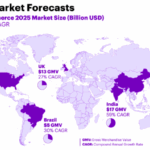Austria’s e-commerce landscape is experiencing a resurgence, fueled by a 5% year-on-year increase in online spending that reached €10.6 billion. However, a new study commissioned by the Austrian Trade Association (Handelsverband) and conducted by KMU Forschung reveals a trend that is causing some concern – the dominance of cross-border purchases.
E-commerce Makes a Comeback
The study paints a picture of an “economic comeback” for online retail in Austria, with growth driven by popular product categories like clothing, electronics, and furniture. This positive trend comes after a period of stagnation, but it’s important to note that inflationary pressures are also contributing to the rise in online spending.
Sustainability Concerns Amidst Inflation
The study also highlights a potential downside of inflation’s impact on consumer behavior. With a focus on value, 42% of respondents reported returning at least one online purchase in the past year, compared to 38% the previous year. This suggests a potential decline in environmental awareness as consumers prioritize affordability over product suitability.
Cross-Border Spending Dominates
Despite the presence of over 12,000 domestic online stores in Austria, the study reveals a surprising fact: more than half (54%) of online expenditure by Austrian consumers goes towards foreign web shops. This trend is particularly pronounced among younger demographics, with half of those over 50 reporting that they never shop from international retailers.
“Dramatic” Outflow of Capital
Rainer Will, director of the Handelsverband, expresses strong concern about this trend. He calls the situation “dramatic,” stating that “almost €6 billion now flows to foreign online stores. Austrians are essentially financing approximately 150,000 jobs abroad, partly due to necessary legal frameworks and inadequate customs controls.”
Looking Ahead: Balancing Growth with Domestic Support
The findings of this study present a complex picture for Austria’s e-commerce landscape. While the overall growth is positive, the dominance of cross-border spending raises concerns about job creation and potential tax revenue loss. It will be interesting to see how Austrian policymakers and businesses address these issues in order to foster a more sustainable and domestically supportive online retail environment. DMSMatrix will continue to monitor developments in this space and provide updates as they become available.










